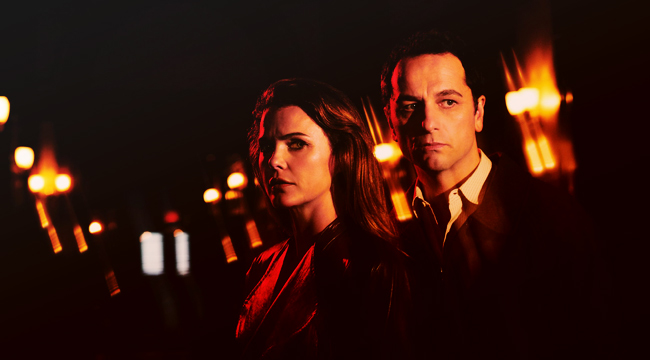
In television, endings are almost always harder than beginnings. Very few shows are created with a specific endpoint in mind — and some of the ones that have them planned out way in advance probably shouldn’t have, like How I Met Your Mother — and many are forced by the economics of the business to stick around well past the point when the story and characters have been drained dry. Even in this modern Golden Age of TV drama, good series finales tend to produce a feeling of relief more than euphoria. For every universally loved conclusion like Six Feet Under, The Shield, or The Leftovers, there are a few dozen divisive endings like The Sopranos and Lost, or universally-hated ones like Dexter becoming a lumberjack.
The Americans‘ attempt to stick the landing has a higher degree of difficulty than most, in that the audience already knows a large part of how the story ends: the United States wins the Cold War, and the Soviet Union ceases to exist, even if elements within Russia live to meddle another day. Showrunners Joel Fields and Joe Weisberg can’t rewrite history, and since the series began not long before the collapse of the USSR, we’ve long been aware that deep cover KGB spies Philip (Matthew Rhys) and Elizabeth (Keri Russell) were on an overall mission destined for failure. There can be no surprise about the big picture here.
But if we know the ending in a global sense, we have no idea what’s coming on a more personal level, and that’s always where this great series has been most comfortable operating. It is a drama about family that successfully dons the right wigs and mustaches to resemble a spy thriller, using the honeypots and assassinations first and foremost to illustrate the many fissures in the Jennings marriage, and in their conflicting parenting styles. We know the Soviet empire will soon crumble, but will the marriage itself — or either partner within it — manage to survive? That’s what’s ultimately at stake here, and why our knowledge of history is only so much of an obstacle to Fields and Weisberg making this work.
The show’s penultimate season was something of a disappointment, often feeling like the writers were simply marking time until they could begin the endgame. The final season (it debuts next Wednesday on FX; I’ve seen the first three episodes) still moves at a measured pace, despite having only 10 episodes to work with instead of the usual 13, but there’s a clear and compelling arc playing out between husband and wife, with a sense of impending doom hanging over them and everyone with the misfortune to know them.
(Minor spoilers follow, though perhaps only Matthew Weiner would define them as such.)
The final season takes the series’ biggest time jump yet, from 1984 all the way to 1987. This means abundant new options for the series’ crack wardrobe and hair teams (college student Paige has a much more adult and au courant ‘do), and it means that we’re that much closer to the end of the war our protagonists have spent their lives fighting. (Much of the conflict revolves around the planned summit between Ronald Reagan and Mikhail Gorbachev.) More importantly from our perspective, though, it means that Philip — who was allowed to retire from most active spy work at the end of last season due to burnout — has been living the carefree life of an ordinary travel agent for a long time now, and that Elizabeth has had to run missions on her own for just as long.
This gives us a new status quo that’s simultaneously funnier and grimmer than anything the series has done in the past. There’s abundant light comedy in seeing how much Philip enjoys getting to live his cover identity for real, while Elizabeth has taken over his role as the member of the family upon whom all of this weighs much too heavy. Between Keri Russell’s performance and the makeup team, Elizabeth has never looked so tired — Philip maybe never looked this tired — and each time she’s handed another new responsibility, another cover job to master, another secret to keep from her husband, the burden is palpable. And with Paige even deeper into the life of a sleeper agent — and becoming very close to Margo Martindale’s Claudia — the divide over how to parent her has only grown wider, because Philip the civilian isn’t even allowed to know all that his daughter has been doing.
The altered status quo of the marriage also reflects how things are rapidly changing back home. Gorbachev is pushing the USSR into a more open and Western governing philosophy, which sounds great to Philip, long an agnostic about their mission, much less so to true believer Elizabeth, and to the factions within the KGB who are interested in having her undermine the summit at all costs.
Life’s also quite different, and increasingly complicated, for Stan (Noah Emmerich), Oleg (Costa Ronin), Aderholt (Brandon J. Dirden), and all the other characters who have managed to survive the game to this point. Some of the Stan/Aderholt work stories still drag in echoes of season five, but nearly every story feels on course to collide at the end of the series in a way that won’t be good for anyone but the viewers who have dedicated parts of the last six years to watching things unfold, alternating between worry for the well-being of the characters whose lives are depicted with such richness and horror at the things they either choose or are forced by circumstance to do.
This has been one of the best dramas of the era, and hopefully we’re a few months away from adding The Americans to the list of great series that managed to end greatly.
Alan Sepinwall may be reached at sepinwall@uproxx.com. He discusses television weekly on the TV Avalanche podcast. His new book, Breaking Bad 101, is on sale now.
